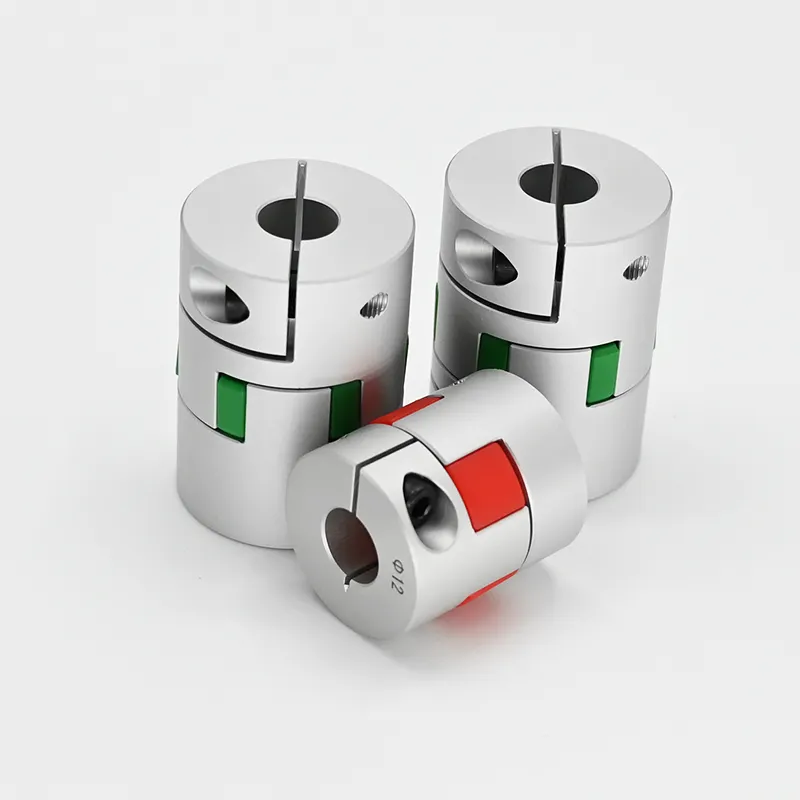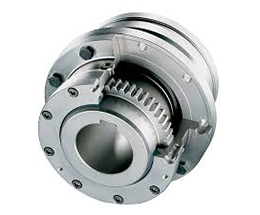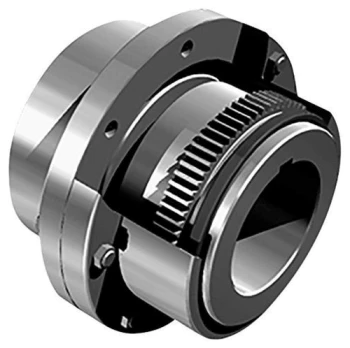Product Description
Densen Customized CNC Motor Jaw Shaft Coupling, Industrial Equipment Flexible Coupling Wholesale
| Product Name | CHINAMFG customized CNC motor jaw shaft coupling, industrial equipment flexible coupling wholesale |
| DN mm | 12~160mm |
| Rated Torque | 25~25000 N·m |
| Allowable speed | 15300~1500 N·m |
| Material | 35CrMo/ZG270/45# steel/Aluminum alloy |
| Application | Widely used in metallurgy, mining, engineering and other fields. |
Product show
Company Information
HangZhou New CHINAMFG Casting and Forging Company is the sales company of HangZhou CHINAMFG Group of Companies. Features of New CHINAMFG simply summarized as below:
1. Trusted supplier of steel, iron & non-ferrous components;
2. Extensive documented quality program in place.
3. Castings, forgings, stampings, machining, welding & fabrication services.
4. 9 related factories, over 50 joint-venture sub-contractors.
5. 25+ years of manufacturing experiences, 10+ years of exporting experience
6. 100% of products sold to overseas customers.
7. 50% of customer base is forturne 500 companies.
Processing support
Casting Service:
Casting is a manufacturing process in which a liquid material is usually poured into a mold, which contains a hollow cavity of the desired shape, and then allowed to solidify.
New Densen offers multiple investment casting, sand casting, permanent casting, die casting, low pressure casting, ESR casting, lost foam casting, etc. Material can be handled include steel, iron, non-ferrous. Single component weight range is from 0.01Kg to 150 tons separately.
Forging Service:
Forging is a manufacturing process involving the shaping of metal using localized compressive forces. New CHINAMFG offers open die forging, closed die forging and ring forging services. Material can be steel, iron and non-ferrous. Material can be handled include steel, iron, non-ferrous. Single component weight range is from 0.1Kg to 50,000Kgs.
Stamping Service:
Stamping (also known as punching) is the process of placing flat sheet metal in either blank or coil form into a stamping press where a tool and die surface forms the metal into a net shape.
New Densen-XBL has more than 60 sets stamping equipments, is the designed supplier for several famous bands automotive companies, has the full ability to offer whole processes from blanking, stamping, welding, to electrostatic spraying for CHINAMFG customers.
Welding & Fabrication Service:
Welding Frabrication is the fabrication process of metal structures by cutting, bending, then assembling the components together through welding
New CHINAMFG offers manual arc welding ,laser welding and robot welding etc. UT, MPT,RT,PT all are available used for inspection, WPS &PQR (Welding Process Specification& Procedure Qualification Records) before production is available under clients’ requirement.
Machining Service:
Machining is any of various processes in which a piece of raw material is cut into a desired final shape and size by a controlled material-removal process.
New Densen-XBL has more than 60 sets precision machines incl. CNC center, boring, milling, lathing, etc., and more than 300 inspection instruments incl. 3 sets CMM with grade μm. Repeated tolerance can be maintained as 0.02mm. Meanwhile awarded by certificates ISO9001-2008; ISO/TS16949. New Densen-XBL specialized in high precise machining for small-middle-big metal components.
3rd Party Inspection:
New Densen worked as 3rd party inspection center besides its sister factories or sub-contractors’ self inspection, Offers process inspection, random inspection and before delivedry inspection services for material, mechanical, inside defects, dimentional, pressure, load, balance, surface treatment, visual inspection and test. Weekly project follow-up report together with pictures and videos, full quality inspection documentation available.
New CHINAMFG also designed as 3rd party inspection representative for several customers when their products made by other suppliers.
Application:
FAQQ1. Are you a manufacturer or a trader?
Manufacture, we have 5 own foundries, 4 in ZheJiang Province, 1 in ZHangZhoug Province
Q2. Do you have MOQ request?
1 pcs per order is ok with us , unless material is seldom used.
Q3. If I only have a sample,without drawings, can you quote then manufacture for me?
Just send us the sample, we would have the sample simulated and measured by professional equipment then issue formal drawings for
you , at the same time, we could help you optimize the design according to your demand and related processes’ feasibility.

Key Factors to Consider When Designing Industrial Couplings for Specific Applications
Designing industrial couplings for specific applications requires careful consideration of various factors to ensure optimal performance, reliability, and safety. Here are some key factors that engineers and designers should take into account during the coupling design process:
- Application Requirements: Understand the specific requirements of the application, including torque and speed requirements, operating conditions (e.g., temperature, humidity), and the type of machinery being connected.
- Power Transmission Capacity: Calculate the required torque capacity and ensure that the selected coupling can safely handle the expected torque loads without exceeding its limits.
- Shaft Misalignment: Consider the potential misalignment between the connected shafts. Choose a coupling type that can accommodate the expected misalignment while maintaining efficient power transmission.
- Space Limitations: Assess the available space for the coupling installation. Select a compact and appropriately sized coupling that fits within the space constraints without compromising performance.
- Environmental Conditions: Evaluate the environmental conditions in which the coupling will operate. Factors such as temperature, humidity, dust, and chemical exposure can influence the choice of materials and lubrication requirements.
- Dynamic Loads: Determine if the application involves dynamic loads, shocks, or vibrations. Select a coupling that can handle such dynamic forces without premature failure.
- Torsional Stiffness: Consider the required torsional stiffness of the coupling based on the application’s precision and response characteristics. A stiffer coupling may be needed for highly precise systems.
- Material Selection: Choose appropriate materials for the coupling components based on the operating conditions, chemical compatibility, and desired mechanical properties.
- Installation and Maintenance: Ensure that the coupling design allows for easy installation and maintenance. Consider features such as split couplings, easy access to bolts, and lubrication points.
- Alignment Requirements: Evaluate the alignment requirements of the coupling. Some couplings may need precise alignment, while others can tolerate moderate misalignment.
- Cost and Life-Cycle Considerations: Weigh the initial cost of the coupling against its expected lifespan and maintenance requirements. Choose a coupling that provides a balance between performance and cost-effectiveness over its life cycle.
By carefully considering these factors during the design process, engineers can create industrial couplings that are tailored to the specific requirements of the application. Properly designed couplings will enhance the performance, efficiency, and reliability of power transmission systems, ultimately contributing to the overall success of the machinery or equipment they are used in.

How do Couplings Contribute to the Overall Efficiency and Productivity of Industrial Processes?
Couplings play a crucial role in enhancing the overall efficiency and productivity of industrial processes by facilitating reliable power transmission and ensuring smooth operation of machinery. Their contributions can be summarized as follows:
- Power Transmission: Couplings efficiently transfer mechanical power between connected shafts, allowing motors to drive various industrial equipment and processes. By maintaining a strong and dependable connection, couplings minimize power losses during transmission, ensuring that the maximum power generated by the motor is effectively utilized in the machinery.
- Torsional Flexibility: Many couplings, such as elastomeric couplings and diaphragm couplings, offer torsional flexibility. This flexibility helps dampen vibrations and shocks generated during machinery operation, protecting both the machinery and the surrounding structures from undue stress. Reduced vibrations also lead to smoother operations, less wear on components, and improved precision in industrial processes.
- Misalignment Compensation: Couplings can accommodate misalignment between connected shafts, whether it’s due to thermal expansion, manufacturing tolerances, or dynamic loads. This ability to compensate for misalignment reduces the need for precision shaft alignment during installation and ensures continuous power transmission even under changing operating conditions. Consequently, machinery downtime is reduced, and maintenance efforts are optimized.
- Overload Protection: Certain couplings, such as torque-limiting couplings and overload couplings, provide protection against sudden torque spikes and overloads. These couplings disengage temporarily when the torque exceeds a preset limit, preventing damage to machinery components and protecting the entire system from catastrophic failures.
- Reduction of Noise and Vibrations: Vibrations and noise can be detrimental to both the machinery and the work environment. By effectively dampening vibrations, couplings contribute to a quieter workplace and improve the overall comfort and safety for operators and personnel.
- Flexible Design and Application: Industrial couplings come in various types and sizes, offering versatility in design and application. This flexibility allows engineers and designers to choose the most suitable coupling for specific industrial processes, optimizing performance and productivity. Whether it’s a high-speed application, a heavy-duty process, or an environment with challenging operating conditions, there is a coupling to meet the requirements.
- Easy Maintenance: Couplings that are properly selected and installed require minimal maintenance. Many couplings are designed with features that facilitate easy access for inspections, lubrication, and replacement if needed. This ease of maintenance reduces downtime and ensures continuous operation of industrial processes.
- Extended Machinery Lifespan: By reducing stress on machinery components, dampening vibrations, and offering protection against overload conditions, couplings contribute to extending the overall lifespan of industrial equipment. This leads to higher return on investment and cost savings in the long run.
In conclusion, industrial couplings are essential components that significantly contribute to the overall efficiency and productivity of industrial processes. By ensuring reliable power transmission, accommodating misalignment, providing overload protection, and dampening vibrations, couplings optimize machinery performance, reduce downtime, and enhance the overall industrial process efficiency.

Types of Industrial Couplings Used in Engineering Applications
Industrial couplings are used in various engineering applications to connect rotating shafts and transmit torque between them. Each type of industrial coupling offers unique features and advantages, making them suitable for specific applications. Here are the different types of industrial couplings commonly used in engineering applications:
- 1. Diaphragm Couplings:
- 2. Gear Couplings:
- 3. Grid Couplings:
- 4. Jaw Couplings:
- 5. Disc Couplings:
- 6. Oldham Couplings:
- 7. Universal Joint Couplings:
Diaphragm couplings use a flexible diaphragm made of metal to transmit torque between the shafts. They are known for their ability to accommodate misalignments, including axial, angular, and parallel misalignments. Diaphragm couplings are used in applications where precise alignment between shafts is challenging or when there are potential misalignment variations during operation. They are commonly found in pumps, compressors, turbines, and high-speed machinery.
Gear couplings transmit torque through gear teeth that mesh together. They are designed for high torque capacity and are known for their durability and rigid construction. Gear couplings can handle high torque and are used in heavy-duty applications, such as steel mills, mining equipment, and large pumps.
Grid couplings use a grid of spring-like elements made of metal to transmit torque. The grid flexes to accommodate misalignments and shock loads, making them suitable for applications with varying loads or where shock absorption is required. Grid couplings are commonly used in pumps, conveyors, and compressors.
Jaw couplings use elastomeric elements to connect the shafts. They are known for their simplicity, ease of installation, and cost-effectiveness. Jaw couplings are suitable for small to medium-sized machinery, including pumps, fans, and small motors.
Disc couplings use thin metal discs to transmit torque between the shafts. They can handle misalignments and are often used in precision applications that require low backlash and high torsional stiffness. Disc couplings find applications in high-precision systems, such as machine tools and robotics.
Oldham couplings consist of three parts: two hubs and a middle block. The middle block allows axial and angular misalignment while maintaining constant velocity between the shafts. They are used in applications where low torque transmission and misalignment compensation are required.
Universal joint couplings are used to transmit torque between shafts at different angles. They are commonly used in automotive applications, such as drive shafts, as well as in industrial machinery with offset shafts.
Each type of industrial coupling has its own advantages and limitations, and the selection of the appropriate coupling depends on factors like torque requirements, misalignment conditions, operating environment, and the specific demands of the application. Engineers carefully consider these factors to choose the most suitable coupling for the particular engineering application, ensuring efficient and reliable power transmission while protecting the connected machinery from excessive stress and wear.


editor by CX 2023-12-07
